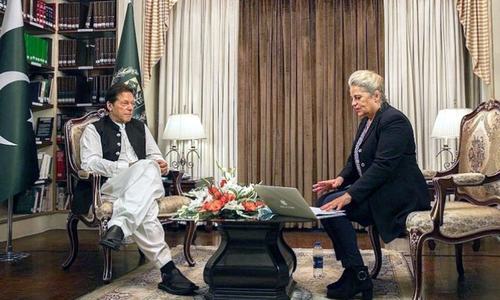FOR many decades now the military establishment in Rawalpindi has been complaining that the West has a narrative about Pakistan that is both unfair and impossible to change. This version of Pakistan, they argue, goes something like this: Pakistan is two-faced, pretending to fight militancy when in fact it supports violent jihadists. Furthermore, Pakistan is a badly governed basket case, obsessed with an unwinnable struggle for Kashmir, rendering it unnecessarily hostile to India.
The establishment’s attempt to overturn the key element of this narrative — support for militancy — has gone through two main phases. Before 9/11 it simply denied that it was supporting militants. And then, more recently, it has pointed to the army’s victories over the Pakistani Taliban in the tribal areas and other parts of northwest Pakistan. To the frustration of successive army chiefs, however, neither approach has shifted the prevailing narrative.
Narratives are extraordinarily durable. Edward Said’s argument about Orientalism — that the West had hard-set, irrational perceptions about the East — amounted to a description of a narrative according to which the East is filled with exotic, irrational, lazy people who continually fail to make the most of Western efforts to show them a better way to live. That set of ideas has been so enduring that it informed not only 19th-century colonialism but also president Bush’s 2003 war in Iraq.
Drones provide another example. When the US was using unmanned aerial vehicles against Al Qaeda and other targets in Fata and Afghanistan, journalists in the West and Pakistan were united in reporting that they killed more civilians than militants, helped Al Qaeda and were a breach of Pakistan’s sovereignty. In the later years of the drone programme, however, none of these things were true. The Bureau of Investigative Journalism, which for years made a very thorough attempt to monitor drone victims, found that between 2013 and 2018 drones killed a minimum of three and a maximum of 15 civilians. That compared with over 300 militants killed. It is not the ratio that most people believe to be true. As for Al Qaeda, internal documents from the organisation released in the course of various US court cases, revealed that drones were the single most effective weapon it faced. Meetings of Al Qaeda operatives became impossible for fear that they would be droned. And the arguments about drones breaching Pakistani sovereignty were always bogus. The drones, after all, took off from a Pakistani airbase.
Narratives are extraordinarily durable.
And yet for all that, even the US, despite all its mastery of the media management, was unable to shift the narrative about drones.
That’s not to say that narratives can never be changed. In the UK one of the main two political parties, the Labour Party, suffered election defeats in 1979, 1983, 1987 and 1992. The party was portrayed by the press as high-taxing, extremist and weak on law and order. After the fourth defeat, a small group of reformers attached themselves to Tony Blair and, rebranding the party as ‘New Labour’, began to challenge the narrative. It took some years but with ruthless control of media messaging and some genuine party reforms, they were able to change the way the party was portrayed in the media and in 1997 Tony Blair was swept to victory.
So where does all that leave the generals hoping to change the narrative about Pakistan? The claims that, in fact, Pakistan does not support militants have faced a couple of problems. First everyone now realises that the much proclaimed arrests of militant leaders are invariably followed by their quietly being released. And then, from time to time, people such as Gen Musharraf, let the cat of the bag by saying Pakistan does support some militant groups.
Even if the ISPR was able to keep everyone on message, Pakistan cannot escape the fact that after 9/11 Pakistan’s policy towards militants could hardly have come under closer scrutiny. Western armies have long since reached a view on what was happening and it’s impossible to imagine a media campaign being sufficient to change their view.
So, if a well-executed media policy is not going to subvert the narrative, that leaves the option of genuine policy changes. At which point Pakistan’s strategists need to take a view on whether it is at this stage worth switching to a new approach. As the US campaign in Afghanistan winds down, Washington is no longer focused on Af-Pak. When he becomes president, Joe Biden is highly unlikely to see Pakistan as a place where he should be sending much foreign aid. All of which suggests that even if Pakistan did change its policy on militants, the foreign aid gains may not outweigh the benefits, as the military strategists see it, of having militants project Pakistani power in the region.
The writer’s book The Bhutto Dynasty: The Struggle for Power in Pakistan was published by Yale University Press recently.
Published in Dawn, December 1st, 2020



































